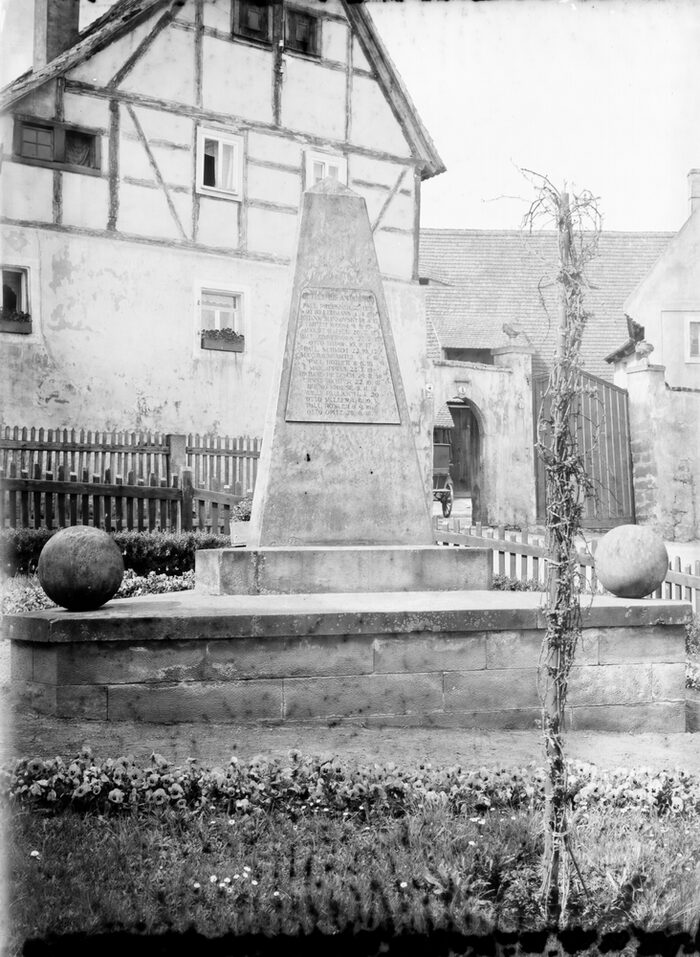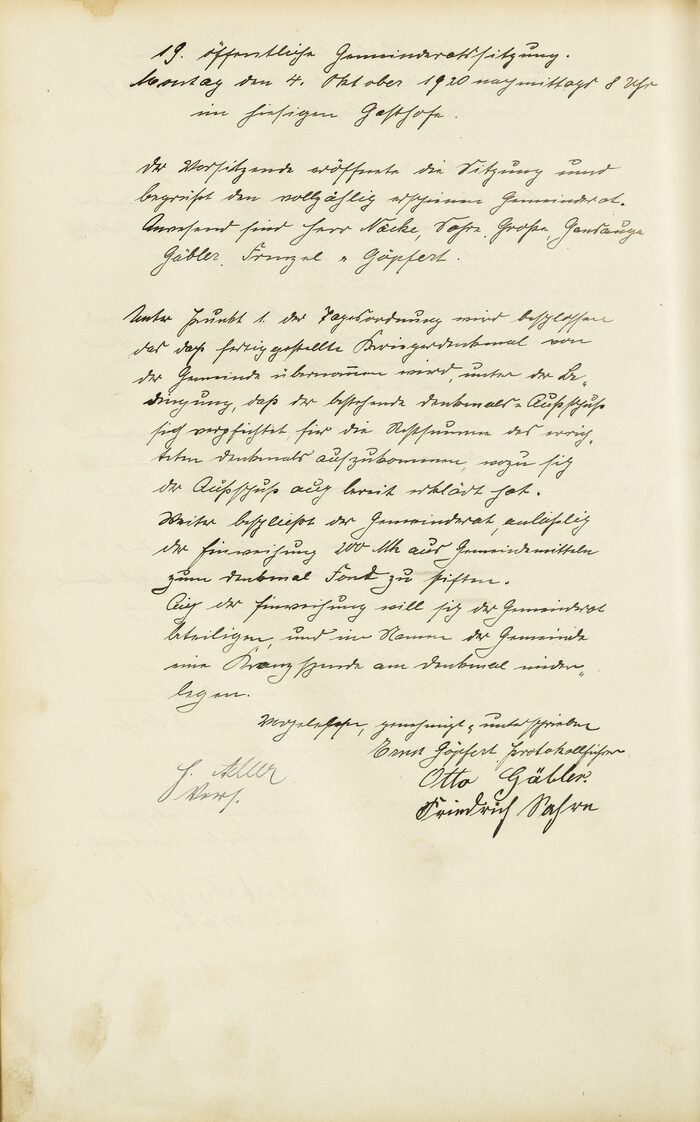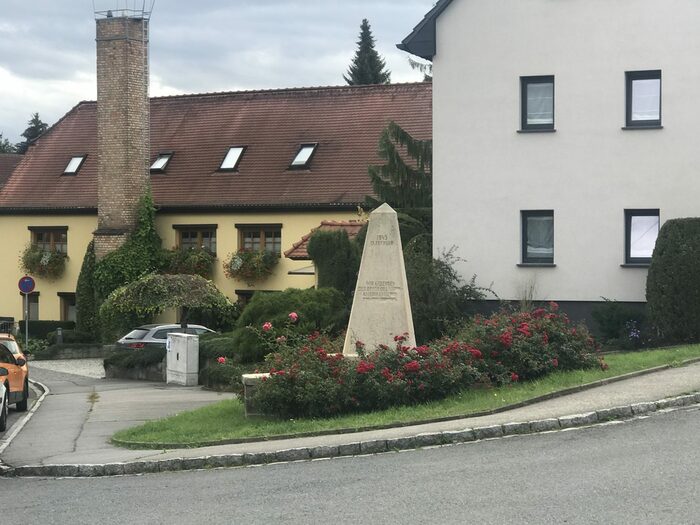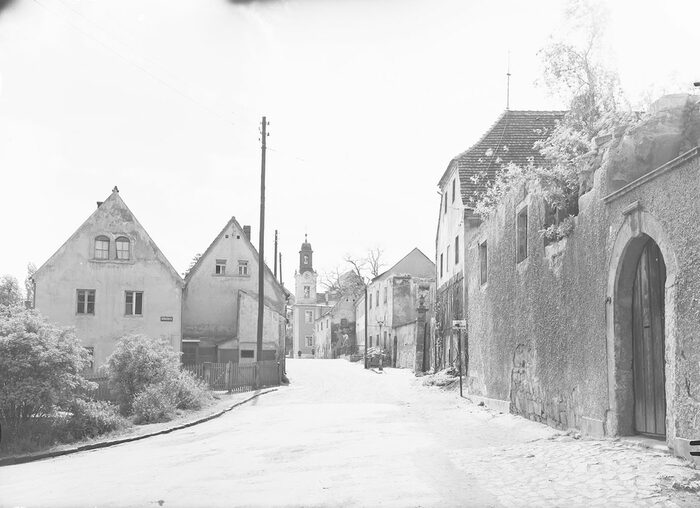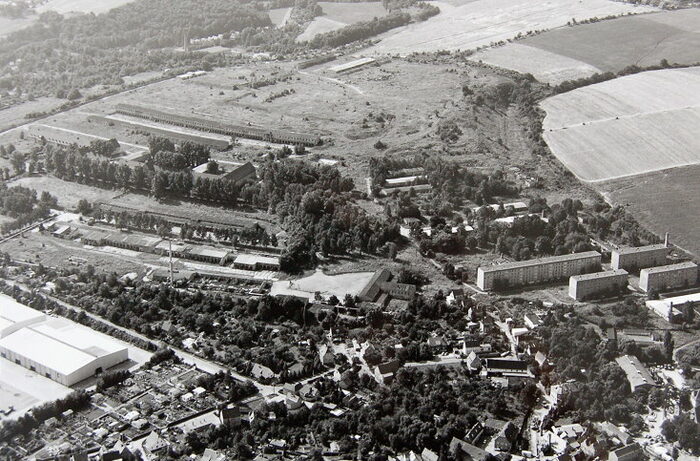Brief history of Nickern
The remains of four circular Neolithic ditched enclosures from the 6th and 5th millennia BC are evidence of early settlements near the Geberbach stream. The number – four enclosures on an area of roughly one square kilometre – is unparalleled. Alongside two simple rondels, in 2002/2003 an enclosure was found with two ditches, plus another enclosure with four concentric ditches and traces of an early Slavic settlement.
The flats of the Geberbach provided fertile land for what were probably the earliest settlers in the Elbe valley. The Geberbach has its source near Bannewitz, flows to the north-east, converges with a branch of the Lockwitzbach near Leuben then enters the Elbe in Tolkewitz as the “Niedersedlitzer Flutgraben” floodway.
The first recorded mention of Nickern was in 1288 as “Nicur”, perhaps named after a tribal elder in the Slavic village. Alternative etymologies trace the name back to the Old Slavonic “ni kuriti”. In this interpretation, “kuriti”, meaning smoking, burning or heating, is negated (i.e. “not smoking”), possibly in reference to land being cleared for farming using slash-and-burn techniques. In 1349, an “allodium et curia” (lord’s demesne) is recorded. This is probably a moated castle in the fens, the remains of which are probably buried beneath the modern-day mansion of Schloss Nickern. In 1693, Hans von Bose had what was then a one-storey building converted into the rural baroque structure that is still found today. The two-storey mansion is one of the oldest buildings in the Dresden municipal area, making it important in terms of both architectural and local history. The bell tower at the front, in the Saxon rural baroque style, was not built until 1870.
Until the 19th century, the village’s inhabitants made their living from agriculture and growing fruit. When the industrial age arrived, many new dwellings were built in Nickern, as elsewhere, reducing the amount of land available for agriculture. In the 1930s, large parts of the village lands were taken over for military purposes such as aviation training for the Luftwaffe. The landscape was transformed by barracks and other military structures. Alongside Altnickern, with its magnificent mansion and the village centre that is well-preserved to this day, the settlement of Neunickern developed. In 1923, Nickern was incorporated into the neighbouring district of Lockwitz, and on 1 January 1930 it became part of Dresden.
After 1935, Nazi plans to occupy the Czechoslovak Republic began to take a more concrete form. To ensure that there would be sufficient support from the air forces, in 1937/38 an extensive complex of barracks was constructed for the Luftwaffe. The headquarters at Heinz-Bongartz-Strasse 8 still bear testimony to that time.
At noon on 14 February 1945, an air raid by American bombers left most of the old village of Nickern in ruins. Schloss Nickern, which was used for administration purposes by the Luftgau III air district command unit, remained largely undamaged. After the Second World War, extensive orchards were grown in the expropriated fields that had once belonged to the mansion. Farmers joined forces to form the “Florian Geyer” agricultural production cooperative (LPG). After 1945, the land and properties previously occupied by the Luftwaffe were used by a panzer division of the Soviet ground forces. In 1968, Red Army panzers set out from this base to crush the Prague Spring. After the withdrawal of the Russian tanks in 1992/93, the Federal Republic of Germany handed over the derelict military site in Nickern to the Free State of Saxony, enabling the area to be cleared of hazardous contamination and reallocated for entirely different uses. At the start of this process of urban redevelopment, it was a sorry sight, with contaminated waste and old ammunition awaiting professional disposal. The built structures were derelict; only a handful of buildings were fit for future use. At first, structural redevelopment was impossible as many surfaces were paved over or otherwise sealed, and there were underground structures, cables and pipes.
Work began on the redevelopment of the derelict site in 1994 to meet the rising demand for land for housing, and especially detached and semi-detached houses. This was partly intended to counteract the trend of young families moving to neighbouring communities offering better opportunities for them to build a home. The challenge was to turn a messy, overgrown area into a new little district in Nickern. The basis for its further development was the purchase of the 56-hectare brownfield site by the City of Dresden and the 1994 launch of a formal funding process known as the Nickern Urban Development Measure. The motto for the site’s development into a residential area was “Live where the town meets the countryside”.
Between 1995 and 1997, all buildings that were no longer needed and could not be renovated were demolished and the soil surface uncovered throughout the former military area; tank parking and manoeuvring surfaces were removed along with all military structures. Another step taken by 2007 to prepare for the subsequent development was to remove all supply lines, rebuild a system of streets and pavements and ensure that the new residential area was connected to the local public transport system. In the building development plans, almost half of the previously derelict land was set aside for large local green spaces, open spaces, parks and playgrounds, so was left free from buildings or sealed surfaces.
Altogether, 58 million euros were invested in the Nickern development zone. The terms of reference for the development project originally encompassed 19 parcels of land. Roughly 600 new plots were created under an allocation plan following the purchase of some 47 hectares of land. The demolition of around 300,000 cubic metres of enclosed space provided space for a new residential site. All the buildings had to be demolished, along with the tank garages, the multi-purpose buildings and all prefabricated concrete buildings apart from the old wing of the barracks. Spaces had to be cleared, 85,000 square metres of sealed surfaces dealt with and some 8,000 cubic metres of contaminated earth removed. Transport and utility connections to the outside world began to be built in 1996, with individual neighbourhood connections following in stages as the sites were brought onto the market. Various types of development attracted 2,000 people from Dresden to live in Nickern. These ranged from the renovation of the historically protected air-force headquarters or the construction of apartment buildings to newly built terraced, semi-detached and detached houses. The roughly 880 new homes are both owner-occupied or rented, including 390 rentals that are publicly subsidised. The motto behind the project, “Live where the town meets the countryside”, can now be experienced in person.
